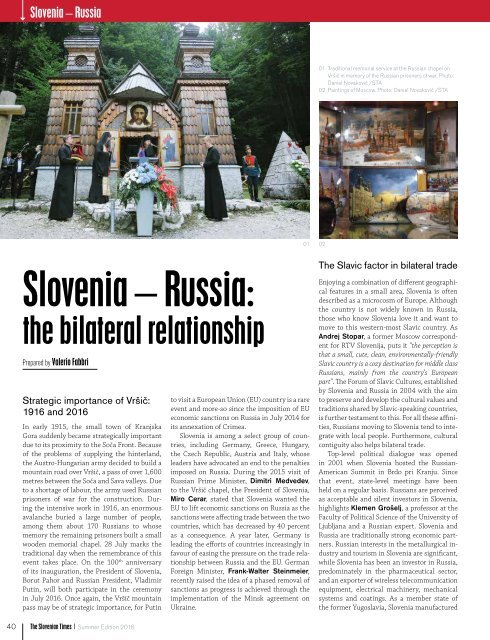Slovenia Times
You also want an ePaper? Increase the reach of your titles
YUMPU automatically turns print PDFs into web optimized ePapers that Google loves.
<strong>Slovenia</strong> – Russia<br />
01 Traditional memorial service at the Russian chapel on<br />
Vršič in memory of the Russian prisoners of war. Photo:<br />
Daniel Novakovič /STA<br />
02 Paintings of Moscow. Photo: Daniel Novakovič /STA<br />
01 02<br />
<strong>Slovenia</strong> – Russia:<br />
the bilateral relationship<br />
Prepared by Valerio Fabbri<br />
Strategic importance of Vršič:<br />
1916 and 2016<br />
In early 1915, the small town of Kranjska<br />
Gora suddenly became strategically important<br />
due to its proximity to the Soča Front. Because<br />
of the problems of supplying the hinterland,<br />
the Austro-Hungarian army decided to build a<br />
mountain road over Vršič, a pass of over 1,600<br />
metres between the Soča and Sava valleys. Due<br />
to a shortage of labour, the army used Russian<br />
prisoners of war for the construction. During<br />
the intensive work in 1916, an enormous<br />
avalanche buried a large number of people,<br />
among them about 170 Russians to whose<br />
memory the remaining prisoners built a small<br />
wooden memorial chapel. 28 July marks the<br />
traditional day when the remembrance of this<br />
event takes place. On the 100 th anniversary<br />
of its inauguration, the President of <strong>Slovenia</strong>,<br />
Borut Pahor and Russian President, Vladimir<br />
Putin, will both participate in the ceremony<br />
in July 2016. Once again, the Vršič mountain<br />
pass may be of strategic importance, for Putin<br />
to visit a European Union (EU) country is a rare<br />
event and more-so since the imposition of EU<br />
economic sanctions on Russia in July 2014 for<br />
its annexation of Crimea.<br />
<strong>Slovenia</strong> is among a select group of countries,<br />
including Germany, Greece, Hungary,<br />
the Czech Republic, Austria and Italy, whose<br />
leaders have advocated an end to the penalties<br />
imposed on Russia. During the 2015 visit of<br />
Russian Prime Minister, Dimitri Medvedev,<br />
to the Vršič chapel, the President of <strong>Slovenia</strong>,<br />
Miro Cerar, stated that <strong>Slovenia</strong> wanted the<br />
EU to lift economic sanctions on Russia as the<br />
sanctions were affecting trade between the two<br />
countries, which has decreased by 40 percent<br />
as a consequence. A year later, Germany is<br />
leading the efforts of countries increasingly in<br />
favour of easing the pressure on the trade relationship<br />
between Russia and the EU. German<br />
Foreign Minister, Frank-Walter Steinmeier,<br />
recently raised the idea of a phased removal of<br />
sanctions as progress is achieved through the<br />
implementation of the Minsk agreement on<br />
Ukraine.<br />
The Slavic factor in bilateral trade<br />
Enjoying a combination of different geographical<br />
features in a small area, <strong>Slovenia</strong> is often<br />
described as a microcosm of Europe. Although<br />
the country is not widely known in Russia,<br />
those who know <strong>Slovenia</strong> love it and want to<br />
move to this western-most Slavic country. As<br />
Andrej Stopar, a former Moscow correspondent<br />
for RTV Slovenija, puts it "the perception is<br />
that a small, cute, clean, environmentally-friendly<br />
Slavic country is a cozy destination for middle class<br />
Russians, mainly from the country’s European<br />
part". The Forum of Slavic Cultures, established<br />
by <strong>Slovenia</strong> and Russia in 2004 with the aim<br />
to preserve and develop the cultural values and<br />
traditions shared by Slavic-speaking countries,<br />
is further testament to this. For all these affinities,<br />
Russians moving to <strong>Slovenia</strong> tend to integrate<br />
with local people. Furthermore, cultural<br />
contiguity also helps bilateral trade.<br />
Top-level political dialogue was opened<br />
in 2001 when <strong>Slovenia</strong> hosted the Russian-<br />
American Summit in Brdo pri Kranju. Since<br />
that event, state-level meetings have been<br />
held on a regular basis. Russians are perceived<br />
as acceptable and silent investors in <strong>Slovenia</strong>,<br />
highlights Klemen Grošelj, a professor at the<br />
Faculty of Political Science of the University of<br />
Ljubljana and a Russian expert. <strong>Slovenia</strong> and<br />
Russia are traditionally strong economic partners.<br />
Russian interests in the metallurgical industry<br />
and tourism in <strong>Slovenia</strong> are significant,<br />
while <strong>Slovenia</strong> has been an investor in Russia,<br />
predominately in the pharmaceutical sector,<br />
and an exporter of wireless telecommunication<br />
equipment, electrical machinery, mechanical<br />
systems and coatings. As a member state of<br />
the former Yugoslavia, <strong>Slovenia</strong> manufactured<br />
40 The <strong>Slovenia</strong>n <strong>Times</strong> | Summer Edition 2016


